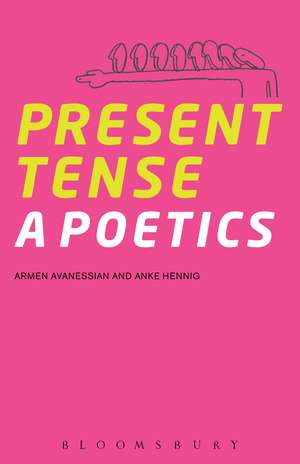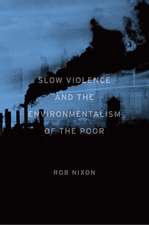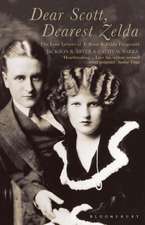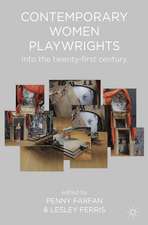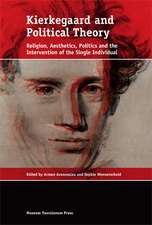Present Tense: A Poetics
Autor Armen Avanessian, Dr. Anke Hennigen Limba Engleză Paperback – 4 noi 2015
| Toate formatele și edițiile | Preț | Express |
|---|---|---|
| Paperback (1) | 192.73 lei 22-36 zile | |
| Bloomsbury Publishing – 4 noi 2015 | 192.73 lei 22-36 zile | |
| Hardback (1) | 831.76 lei 43-57 zile | |
| Bloomsbury Publishing – 4 noi 2015 | 831.76 lei 43-57 zile |
Preț: 192.73 lei
Preț vechi: 223.41 lei
-14% Nou
Puncte Express: 289
Preț estimativ în valută:
36.89€ • 40.08$ • 31.01£
36.89€ • 40.08$ • 31.01£
Carte disponibilă
Livrare economică 31 martie-14 aprilie
Preluare comenzi: 021 569.72.76
Specificații
ISBN-13: 9781628927641
ISBN-10: 162892764X
Pagini: 304
Dimensiuni: 140 x 216 x 20 mm
Greutate: 0.41 kg
Editura: Bloomsbury Publishing
Colecția Bloomsbury Academic
Locul publicării:New York, United States
ISBN-10: 162892764X
Pagini: 304
Dimensiuni: 140 x 216 x 20 mm
Greutate: 0.41 kg
Editura: Bloomsbury Publishing
Colecția Bloomsbury Academic
Locul publicării:New York, United States
Caracteristici
A new view on literary history, especially the development of the twentieth-century novel
Notă biografică
Armen Avanessian is Visiting Faculty in the MA Aesthetics and Politics program in the School of Critical Studies at the California Institute of the Arts, USA, and, since 2014, Visiting Lecturer at the Art Institute, FHN Academy Basel, Switzerland. Previously he has been a Visiting Fellow in the German Department at Columbia University and in the German Department at Yale University. From 2007-2014 he taught at the Peter Szondi Institute of Comparative Literature at Free University Berlin, Germany. He is editor in chief at Merve Verlag Berlin. In 2012 he founded a bilingual research platform on Speculative Poetics, including a series of events, translations and publications: www.spekulative-poetik.de. Anke Hennig is a theorist of literature and visual culture. Currently she is teaching at Central Saint Martins, University of the Arts, London, UK, and organising the international research group 'Retro-Formalism' (www.retroformalism.net). Previously she taught at the Peter Szondi Institute of Comparative Literature at Free University Berlin, Germany, and has been a Fulbright Fellow at New York University, USA.
Cuprins
AcknowledgmentsIntroduction1. The Present Tense Novel2. Readings in Methodology3. The Imaginary Present Tense4. Tense PhilosophyConclusionGlossaryNotes
Recenzii
This book renews attention to poetics as a worthy field of literary studies by offering a thorough and systematic examination of the narrative and philosophical significance of tense. The manner of delivery is engaging even as it remains scholarly. Fresh, at times daring, in its propositions, this work will no doubt provoke interest and generate discussion.
Combining linguistics, literary theory and philosophy of time - in particular utilising Gilles Deleuze's three paradoxes of the past and Gustave Guillaume's language theory - the authors deliver a sound technical analysis of the development of the novel. Claiming that 'only language has the power to define the boundaries of the present,' they produce an innovative and integrated fiction-narratological approach that can be used to identify the characteristics of the altermodern novel. . Spanning a range of avant-garde writers, philosophers and linguists from Britain, the US, Russia, France, Italy and Germany, this study presents a fascinating insight on temporality and tense-patterns in narrative, demonstrating how the past can be as unpredictable as the future.
Avanessian and Hennig explore the use of the present tense in novels of the late 20th and early 21st centuries. Specifically, they borrow the art-theoretical term 'altermodern,' first used by art scholar Nicolas Bourriaud, to categorize contemporary novels that employ a new understanding of the present tense, one that marks a break with previously published present-tense novels that employ classical narration. Avanessian and Hennig further argue that the altermodern novel reflects a new understanding of the novel's relationship to time and changes the reader's understanding of the relationship between narration and time. ... [T]he book includes some smart, well-articulated readings of novels. In fact, one of the strengths of this book is the use of exemplary passages from novels written in English, French, German, and Russian; this study does a great job of broadly surveying novels from many traditions. Summing Up: Recommended. Graduate students, researchers, faculty.
How do we account for the widespread use of the present tense in contemporary narratives? What has happened to our understanding of time if a fundamental tenet of fictionality-the idea that narratives make present something that happened in the (real or imagined) past-seems no longer operative? Drawing on narratology, cognitive science, deconstruction and philosophy of language, Avanessian and Hennig reconceptualize the relation between time and narrative; what is more, they rethink poetics as an expanded cultural theory concerned with human world-making. An impressive tour de force.
Combining linguistics, literary theory and philosophy of time - in particular utilising Gilles Deleuze's three paradoxes of the past and Gustave Guillaume's language theory - the authors deliver a sound technical analysis of the development of the novel. Claiming that 'only language has the power to define the boundaries of the present,' they produce an innovative and integrated fiction-narratological approach that can be used to identify the characteristics of the altermodern novel. . Spanning a range of avant-garde writers, philosophers and linguists from Britain, the US, Russia, France, Italy and Germany, this study presents a fascinating insight on temporality and tense-patterns in narrative, demonstrating how the past can be as unpredictable as the future.
Avanessian and Hennig explore the use of the present tense in novels of the late 20th and early 21st centuries. Specifically, they borrow the art-theoretical term 'altermodern,' first used by art scholar Nicolas Bourriaud, to categorize contemporary novels that employ a new understanding of the present tense, one that marks a break with previously published present-tense novels that employ classical narration. Avanessian and Hennig further argue that the altermodern novel reflects a new understanding of the novel's relationship to time and changes the reader's understanding of the relationship between narration and time. ... [T]he book includes some smart, well-articulated readings of novels. In fact, one of the strengths of this book is the use of exemplary passages from novels written in English, French, German, and Russian; this study does a great job of broadly surveying novels from many traditions. Summing Up: Recommended. Graduate students, researchers, faculty.
How do we account for the widespread use of the present tense in contemporary narratives? What has happened to our understanding of time if a fundamental tenet of fictionality-the idea that narratives make present something that happened in the (real or imagined) past-seems no longer operative? Drawing on narratology, cognitive science, deconstruction and philosophy of language, Avanessian and Hennig reconceptualize the relation between time and narrative; what is more, they rethink poetics as an expanded cultural theory concerned with human world-making. An impressive tour de force.
